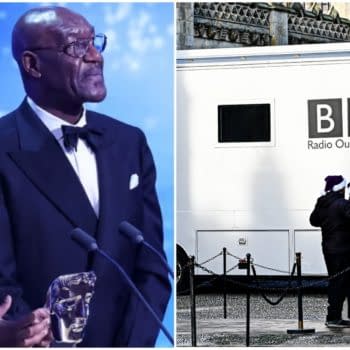Posted in: Movies, Recent Updates | Tagged: box office, film, harry potter, jonathan gems, margaret thatcher, Matthew Vaughn
Good News For American Film Industry As Deathly Hallows Part 2 Breaks Records
Well, we probably all saw this coming but the final instalment in the Harry Potter franchise has smashed its way through box office records with a worldwide weekend gross of over $476 million. Records broken included single-day box office (Last Friday the film pulled in $92.1 million), UK gross ($36.6 million) and IMAX opening weekend record (worldwide gross of $23.5 million). Thanks to Deadline for the numbers.
Blimey, what a lot of millions, eh? It cannot be denied that these films are a triumph of the British film industry, with an all-star British cast and filming locations all round the country, including the famed Pinewood Studios. Not mention the fact that all the profits are going to that extremely British production company, Warner Bros. Oh…
Yes, this is a bit of a sticking point for me when it comes to celebrating the success of British movies. Call me a Scrooge, but when everyone raves about films like Shaun of the Dead and Hot Fuzz, I can't help but remember that they'd probably never have been made without the help of Universal Pictures. The great British epic fantasy sagas such as Chronicles of Narnia and Lord of the Rings may never have seen a big screen adaptation without the intervention of Disney and New Line Cinema. Even one of the coolest British action heroes around, James Bond, would have been running round cardboard sets with papier-maché guns long ago were it not for the intervention of MGM and Columbia Pictures.
6 years ago, after the release of Harry Potter and The Prisoner of Azkaban, screenwriter Jonathan Gems wrote an article for The Independent gently reminding everyone about just exactly how the films are made possible.
"When JK Rowling was approached to sell the rights to her Harry Potter books, she wanted them to go to a British studio. But there isn't one. So she sold Harry Potter to Warner Bros. The UK Film Council brags about the massive success of the Harry Potter movies, but this is sheer nonsense. Their success is a humiliating demonstration of the abject failure of our industry."
The UK Film Council certainly isn't boasting any more, since it was abolished during the cuts last year. Though the Council had funded films such as In The Loop and Made in Dagenham, it had been subject to heavy criticism about the efficiency of its spending and its ability to turn a profit. Director Matthew Vaughn (X-Men: First Class, Kick-Ass) was one of the industry experts who advised on the closing-down of the UKFC, and afterwards he began devising a replacement in an attempt to ensure that at least some of the profits from British films might go back into their home country. When commenting on the controversial decision, Vaughn had this to say.
"Britain has the best directors, writers, producers, actors and crews in the world. We also have the two biggest franchises of all time: Harry Potter and James Bond. Shot in England. Made by the British. But all the money goes back to America."
If you think that this is all coming round to an attack on those bloody Americans for stealing all our talent and reaping the profits from our British institutions, I'm afraid I'll have to disappoint. In fact, I applaud Twentieth Century Fox, Warner Bros, Disney and Universal Pictures for not only investing in British film but also for choosing to shoot so many American films in Pinewood Studios, thereby providing employment for British film industry workers. If our cinematographers, actors, lighting technicians, grips and make-up artists had to rely on British production companies for work they'd be up a certain creek without a paddle. As Gems also pointed out, it doesn't even come down to a lack of money on our part.
"Before the abolition of the Eady Levy and capital allowances, we had our own film industry […] The Eady Levy worked as follows: in exchange for access to our domestic market, foreign distributors paid the government a small percentage of the income they received from selling their films in Britain. This was a benign tax because if their movies did badly they lost very little, and if they performed well their losses from the levy were insignificant compared to their profits […] The only route to a British film revival is through legislation, but no arts minister has had the power in Cabinet to make this happen."
The Eady Levy tax was abolished by Margaret Thatcher in 1985, along with a screen quota for British films (France and Canada still implement a screen quota to ensure that around 30% of films released in their cinemas are domestically produced). Matthew Vaughn also argued for the reinstatement of the levy 5 years later, saying that "Hollywood studios should have to pay back tax credits for shooting in Britain and also pay a share of profits."
Occasionally, of course, the planets align favourably and the seed of British talent reaches the egg of British investment without brushing up against the uterine walls of American Monopoly (er, sorry, that metaphor got a bit graphic) and you'll get an out-and-out British gem like This is England, Submarine or In The Loop. But these films are too few and too far between, and even with American studios throwing us scraps it's becoming increasingly difficult to find a selection of British films at your local Odeon these days.
Not counting Harry Potter, of course.















